Episodes
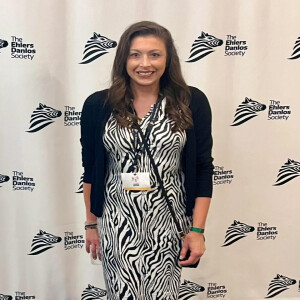
Monday Mar 24, 2025
Monday Mar 24, 2025
In this episode of Zebra Talks, host Dr. Libby Hinsley discusses the challenges and experiences of living with hypermobility syndromes with guest Lauren Brown. Diagnosed with hypermobile Ehlers-Danlos Syndrome and POTS, Lauren shares her long and complicated journey through a diagnostic maze, frequent medical gaslighting, and the significant impact of finding knowledgeable and empathetic healthcare providers.
Despite her struggles, Lauren started a YouTube channel, POTS Zebra, to raise awareness and support others facing similar conditions. This episode highlights the importance of community, persistence, and self-advocacy in managing chronic illnesses.
Highlights of this episode include:
00:00 Introduction to Zebra Talks
00:35 Meet Lauren Brown: A Journey with EDS and POTS
01:44 Early Signs and Misdiagnoses
04:13 High School Struggles and a Breakthrough
06:29 College and Beyond: Continued Challenges
12:45 A Lifesaving Diagnosis
13:46 Ongoing Health Battles and Advocacy
19:11 Finding the Right Doctor
19:45 Sharing the Journey
22:02 Medical Gaslighting and Bias
23:11 The Importance of Diagnosis
27:19 Building a Support Network
30:10 Starting a YouTube Channel
33:11 Resources and Support
36:02 Final Thoughts and Community
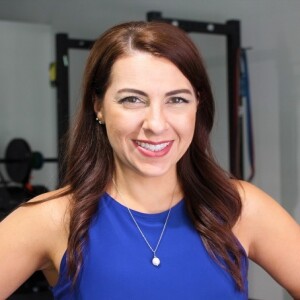
Monday Mar 17, 2025
Monday Mar 17, 2025
In this episode of Zebra Talks, host Dr. Libby Hinsley, physical therapist and author of 'Yoga for Bendy People,' talks with guest Dena Mellick, a barbell coach and founder of Strength Equity.
Dena shares her journey from chronic illness and pain management to becoming a strength coach. They delve into the intricacies of training clients with hypermobility syndromes (HSD) and Ehlers-Danlos Syndrome (EDS), emphasizing the importance of resistance training and collaborative approaches for managing pain and improving quality of life.
Dena explains the benefits of strength training, particularly in combating age-related muscle loss, and offers practical tips for finding the right coach, avoiding common red flags, and accommodating individual needs. They also discuss the significance of progressive overload, appropriate equipment, and the critical role of protein in muscle recovery and maintenance.
Highlights of this episode include:
00:00 Introduction to Zebra Talks
00:35 Meet Dena Mellick: Strength Coach and Lifter
01:47 Dena's Journey to Lifting
03:30 The Importance of Strength Training
06:19 Powerlifting and Olympic Lifting Explained
09:04 Training Hypermobile Clients
16:26 Finding the Right Coach or Trainer
19:46 Resources for Training with Pain
22:30 Training with Hand Injuries
23:26 Green Flags in a Strength Coach
23:50 Red Flags to Avoid in a Coach
25:07 Importance of Proper Equipment
28:32 Personal Experiences with Coaching
30:08 One-on-One vs Group Training
32:25 Adapting Training to Life Stressors
35:17 Encouraging Barbell Use at Home
38:12 Getting Started with Resistance Training
40:43 Final Thoughts and Contact Information

Monday Mar 10, 2025
Monday Mar 10, 2025
In this episode of Zebra Talks, Dr. Libby Hinsley hosts Dr. Derik Anderson, a chiropractor and expert in soft tissue research and treatment, to discuss various facets of managing hypermobility syndromes.
Dr. Anderson shares his journey into treating Ehlers Danlos Syndrome, insights on fascia differences in bendy bodies, and the role of heart rate variability (HRV) in energy management. They also delve into the importance of joint stabilization, nutrition, and innovative approaches like vibration therapy to improve the quality of life for those with hypermobility.
The episode emphasizes the significance of a holistic and individualized approach to care, reflecting on the need for managing systemic inflammation and energy levels to enhance recovery and overall health.
Highlights of this episode include:
00:00 Introduction to Zebra Talks
00:40 Meet Dr. Derik Anderson
01:34 Dr. Anderson's Journey with EDS
05:40 Understanding Fascia in Bendy Bodies
16:23 Heart Rate Variability and Energy Management
28:08 Tools and Techniques for Fascia and Muscle Health
34:40 Nutritional Insights for Bendy Bodies
36:51 Conclusion and Contact Information
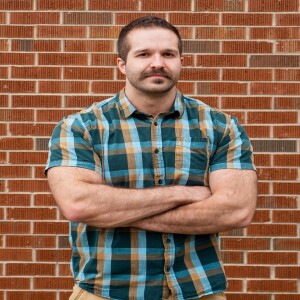
Monday Mar 03, 2025
Monday Mar 03, 2025
In this episode of Zebra Talks, host Dr. Libby Hinsley speaks with Rob West, a physical therapist and board certified orthopedic specialist. They discuss the use of blood flow restriction (BFR) training as a tool for improving strength and managing symptoms in patients with Ehlers Danlos Syndrome (EDS) and Postural Orthostatic Tachycardia Syndrome (POTS).
Rob shares his journey from learning about EDS through a classmate to becoming a specialist in treating this population. He provides insights into how BFR works, its benefits, and necessary precautions. Rob also highlights the positive impact BFR and trunk compression with weightlifting belts can have on cerebral perfusion and symptom management for POTS patients. Additionally, he shares inspiring case studies of patients who have significantly improved their quality of life through these training methods. Listeners will gain a deeper understanding of these innovative approaches to physical therapy and their practical applications.
Highlights of this episode include:
00:00 Introduction to Zebra Talks
00:35 Meet Rob West: Physical Therapist and Strength Specialist
02:58 Understanding Blood Flow Restriction Training
05:37 Applying BFR in Clinical Practice
08:29 BFR for POTS Management
27:22 Patient Success Stories with BFR
31:15 Closing Thoughts and Contact Information

Monday Feb 24, 2025
Monday Feb 24, 2025
In this episode of Zebra Talks, Libby welcomes Dr. David Saperstein, Director of the Center for Complex Neurology, EDS, and POTS in Phoenix, Arizona. Dr. Saperstein shares his journey into specializing in EDS and POTS, the complexities of diagnosing and treating POTS, and the importance of staying curious and open-minded in medical practice.
They discuss the challenges of diagnosing POTS, the importance of thorough testing, and various treatment strategies, including the critical role of salt and water intake. Dr. Saperstein also emphasizes the need for flexibility in treatment plans to better meet individual patient needs. Tune in to gain valuable insights into managing these complex conditions and hear about Dr. Saperstein's innovative approaches.
00:00 Introduction to Zebra Talks
00:35 Meet Dr. David Saperstein
01:45 Dr. Saperstein's Journey into EDS and POTS
03:47 Challenges in Diagnosing and Treating POTS
10:00 Understanding POTS and Its Complexities
18:29 Diagnostic Criteria and Testing for POTS
31:06 Treatment Strategies for POTS
36:54 Managing POTS with Lifestyle Changes
41:36 Conclusion and Contact Information

Monday Feb 17, 2025
Monday Feb 17, 2025
In this episode of Zebra Talks, Dr. Libby Hinsley hosts biomechanist and bestselling author Katy Bowman to discuss the unique features of hypermobile bodies. Katy shares her insights on biomechanics, tissue creep, and the importance of proprioception and attentional focus for hypermobile bodies.
They also explore the impact of sedentary culture and strategies for integrating more diverse movements into daily life. Katie explains her evolutionary perspective on movement and emphasizes the need for hypermobile individuals to engage in movement that enhances body awareness and stability.
Practical tips, theoretical insights, and Katie's innovative approach to movement therapy make this a must-listen for those living with hypermobility.
Highlights of this episode include:
00:35 Meet Katie Bowman: Biomechanist and Movement Expert
01:56 Understanding Biomechanics and Hypermobility
09:40 The Impact of Sedentary Culture on Hypermobility
17:17 Practical Tips for Managing Hypermobility
22:15 The Psychological Aspect of Movement
34:00 Final Thoughts and Resources
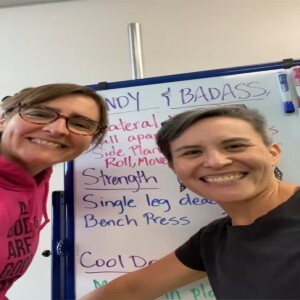
Monday Feb 10, 2025
Monday Feb 10, 2025
In this episode of Zebra Talks, host Dr. Libby Hinsley is joined by strength and conditioning coach Becca Lee to discuss their collborative innovative strength training class 'Bendy and Badass,' designed specifically for people with hypermobility syndromes.
They share their journey in developing the class, discuss the unique challenges faced by hypermobile individuals, and explain effective strategies and exercises used to help participants build strength and improve quality of life. The conversation also highlights the importance of slow, controlled movements, personalized programming, and the significance of community support within the class setting.
Highlights of this episode include:
00:35 Meet Becca Lee: Strength and Conditioning Coach
01:03 The Journey to Bendy and Badass
01:23 Becca's Coaching Philosophy
03:28 Libby's Personal Training Experience
12:59 The Birth of Bendy and Badass Class
14:23 Class Structure and Community Impact
16:14 Exercise Selection and Programming
23:10 Dumbbells and Progressive Loading
23:34 Four-Week Programming Cycle
28:36 Importance of Slow and Controlled Movements
34:11 Rate of Perceived Exertion (RPE)
40:57 Community and Individual Progress
46:13 Conclusion and Final Thoughts
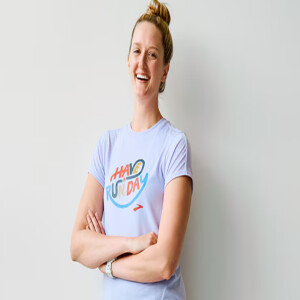
Monday Feb 03, 2025
Monday Feb 03, 2025
In this episode of Zebra Talks, host Dr. Libby Hinsley is joined by Dr. Kate Bochnewetch, a physical therapist and run coach, to discuss running with hypermobile Ehlers-Danlos Syndrome (hEDS), Hypermobility Spectrum Disorders (HSD), and other chronic illnesses.
Kate shares her personal journey with hypermobility, POTS, and chronic migraine, and how these experiences influenced her approach to training runners with similar conditions. Topics covered include the importance of a gentle, conservative, and health-focused training plan, the role of strength training, managing stress, and the selection of appropriate footwear.
Kate also offers insights into pacing and mental preparedness, emphasizing the need for individualized care and flexibility in exercise routines. Listeners interested in learning more about Kate's work can find her on Instagram at @the_running_dpt or visit her website at therunningdpt.com.
Highlights of this episode include:
00:00 Introduction to Zebra Talks
00:35 Meet Kate Bognawicz: Physical Therapist and Coach
01:36 Kate's Journey with Hypermobility
03:30 Challenges in Traditional PT Practice
06:34 Approach to Running Training for EDS/HSD
08:20 Indicators for Running Readiness
10:07 Debunking Myths About Running with EDS/HSD
14:31 Strength Training for Joint Stability
16:51 Running Progression Timeline
22:04 Managing POTS in Running Training
24:14 Footwear Recommendations
27:08 Run-Walk Approach and Stress Management
32:18 Conclusion and Contact Information

Monday Jan 27, 2025
Monday Jan 27, 2025
In this episode of Zebra Talks, host Dr. Libby Hinsley welcomes Nikki Naab-Levy, a certified strength and nutrition coach with extensive experience in helping hypermobile individuals.
Nikki shares her personal journey with hypermobility and discusses the benefits of strength training for those with hypermobility syndromes. They explore the importance of understanding one's limits, the concept of rate of perceived exertion (RPE), and how to adjust training programs appropriately. The conversation also touches on the significance of proper nutrition and body autonomy. Listeners are provided with practical advice on how to approach strength training safely and effectively, even when dealing with chronic conditions.
Highlights of this episode include:
00:00 Introduction to Zebra Talks
00:35 Meet Nikki Naab-Levy
01:29 Nikki's Personal Journey with Hypermobility
04:16 The Benefits of Strength Training for Hypermobile People
04:40 Understanding 'Heavy' in Strength Training
06:43 Approach to Strength Training for Hypermobile Individuals
15:53 Progressing in Strength Training
23:52 The Importance of Deloading
25:11 The Importance of Deload Weeks
25:45 Listening to Your Body's Cues
27:52 Adjusting Workouts for Hypermobility
31:39 Indicators for Slowing Down
32:13 Mental Strategies for Setbacks
37:11 Nutrition and Recovery for Hypermobility
40:30 The Role of Alignment and Load
46:41 Final Thoughts on Body Autonomy
48:32 Where to Find More Information
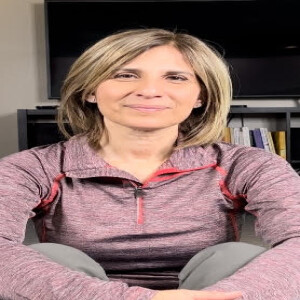
Monday Jan 20, 2025
Monday Jan 20, 2025
In this episode of Zebra Talks, host Dr. Libby Hinsley talks with Dr. Mamak Shakib, a chiropractic physician specializing in functional mobility, joint hypermobility, and pelvic floor dysfunction. Dr. Shakib shares her 30-year journey in treating hypermobile patients, emphasizing the importance of developmental kinesiology and dynamic neuromuscular stabilization (DNS) for sustainable joint health and stability.
She discusses common issues faced by hypermobile individuals in traditional chiropractic and rehabilitation settings, the significance of tailored approaches, and the role of proper breathing techniques in maintaining functional stability. The episode sheds light on Dr. Shakib's unique methodologies and her advocacy for better communication and understanding between healthcare providers and patients with hypermobility syndromes.
Highlights of this episode include:
00:00 Introduction to Zebra Talks
00:35 Meet Dr. Mamak Shakib
01:58 Discovering Hypermobility
07:23 Challenges in Traditional Rehabilitation
20:55 Dynamic Neuromuscular Stabilization (DNS)
34:05 Breathing Techniques for Bendy People
45:45 Final Thoughts and Resources







